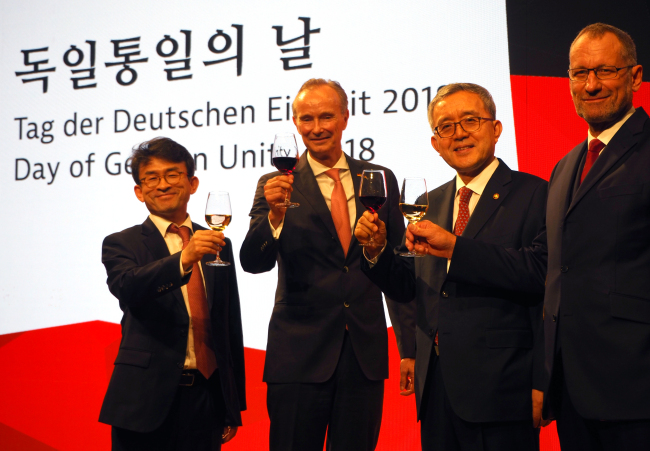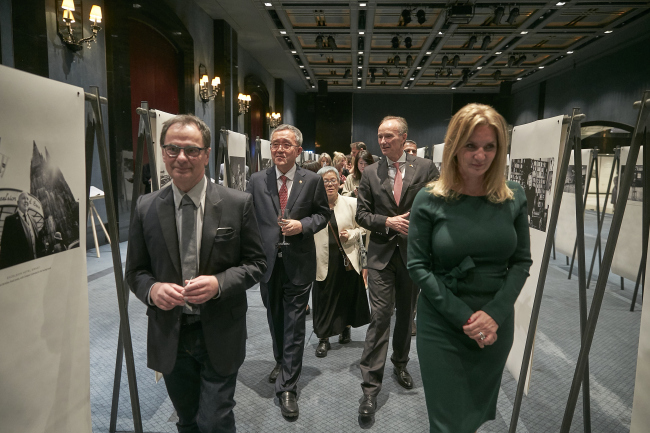With the two Koreas upping their efforts at rapprochement, a reunified Germany looks to the Korean Peninsula with particular interest and passion, said Germany’s top envoy to Korea, adding that Berlin and Seoul are important partners in an “alliance for multilateralism.”
“As a reunited country celebrating the 28th anniversary of unification, Germany is looking with a particular interest to the Korean Peninsula. People in Germany feel for Koreans. We see Korea as an important value-based partner in our ‘alliance for multilateralism.’” Ambassador Stephan Auer said at a reception marking the Day of German Unity on Friday in Seoul.
“Germans and Koreans share the same interests and values and can count on each other. Together, we are stronger, and have better chances of reaching our goals. We fight together to preserve and strengthen a rules-based, multilateral world order as well as global free trade.”
 |
German Ambassador Stephan Auer (second from left), Korean Minister of Personnel Management Kim Pan-suk (second from right), German Trade and Invest CEO Jurgen Friedrich (right) and Standing Commissioner at National Human Rights Commission of Korea Jung Sang-hwan pose at the Day of German Unity reception in Seoul on Friday. (Joel Lee/The Korea Herald) |
Oct. 3 is the Day of German Unity -- a national day that celebrates the anniversary of German reunification in 1990, when the goal of bringing together a Germany split as a result of World War II was realized. The day -- when the nation’s reunification was formally completed with the disestablishment of the German Democratic Republic (East Germany) and its absorption into the Federal Republic of Germany -- has been celebrated since 1990.
“One event over the last few months that has reassured me of our excellent relations has been your recognition of Germany as a medical supporting nation,” Auer highlighted. “During the Korean War, the Federal Republic of Germany promised South Korea humanitarian medical support, which arrived in the form of doctors, nurses and medical supplies through 1954. In paying tribute to this decision that helped some 300,000 South Koreans, the Korean government still honors Germany’s aid in various ways.”
The ambassador stressed that the two nations combat climate change and environmental pollution together, adding their alliance for multilateralism needs strong teammates to secure lasting peace and prosperity around the globe.
The two also work on innovation and research, trade and invest in each other’s country, make music and play sports together, he said. “From the bottom of my heart, I wish for our Korean guests here that you will be able to celebrate Korean unity in peace and freedom in a not-too-distant future.”
At the reception the photography exhibition “German Contemporary Excellence,” by Gerhard Steidl and the Meisterkreis, was held, showcasing images that illuminate diverse aspects of success in a reunified, present-day Germany. The pictures stimulate discussions about the complementarity of the German and Korean economies as well as their cultures, arts and technologies, according to the diplomat.
 |
At the reception the photography exhibition “German Contemporary Excellence,” by Gerhard Steidl and the Meisterkreis, was held, showcasing images that illuminate diverse aspects of success in a reunified, present-day Germany. (German Embassy) |
“This year, our two countries celebrate 135 years of diplomatic relations. The miracle on the Rhine inspired the miracle on the Han River,” said Korean Minister of Personnel Management Kim Pan-suk. “With over $28 billion of bilateral trade last year, Germany is our largest trade partner in Europe, and home to some 40,000 Koreans. Last year, Allianz, BASF and many other renowned German companies invested $13.2 billion in Korea.”
The Ministry of Personnel Management is operating a training course for its high-level public officials at the Free University of Berlin. Using Germany’s experiences and expertise, it is also conducting research on providing prospective capacity-building programs for North Korean officials for future inter-Korean exchanges.
“Germany’s experience of reunification is a precious lesson for us. Despite issues unique to each country, the Eastern Policy, gradual expansion of exchanges between East and West Germany, mitigation of social conflicts and economic challenges caused by reunification and other historical experiences inspire all Koreans,” said Kim.
“Ambassador Stephan Auer and I have had lengthy discussions on German reunification as well as peace on the Korean Peninsula. I was impressed by his remark that the key to its reunification was German people’s willingness to unify and their aspiration for peace and prosperity.”
Lauding Germany as the “vibrant heart of the European Union” and “growth engine of the entire continent,” Kim added, “I am hopeful that Korea will become the Germany of East Asia to pave the way for an East Asian economic community and multilateral peace and security regime.”
By Joel Lee (
joel@heraldcorp.com)








![[Today’s K-pop] Blackpink’s Jennie, Lisa invited to Coachella as solo acts](http://res.heraldm.com/phpwas/restmb_idxmake.php?idx=644&simg=/content/image/2024/11/21/20241121050099_0.jpg)
